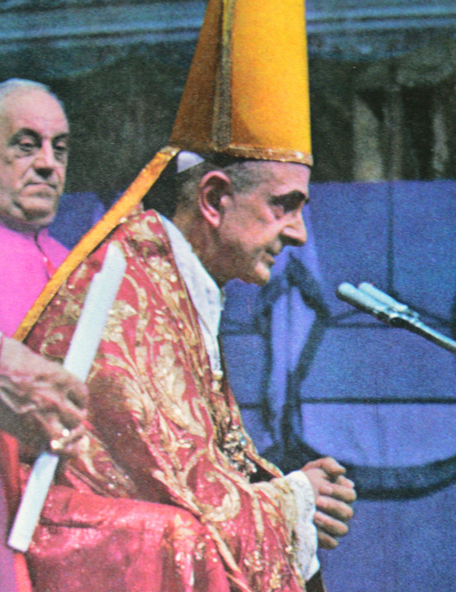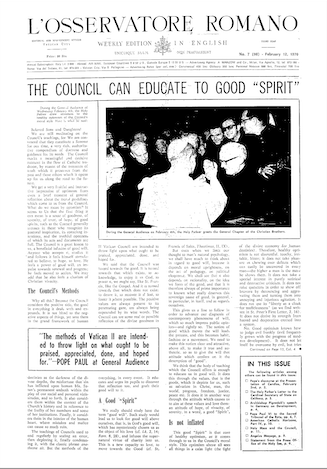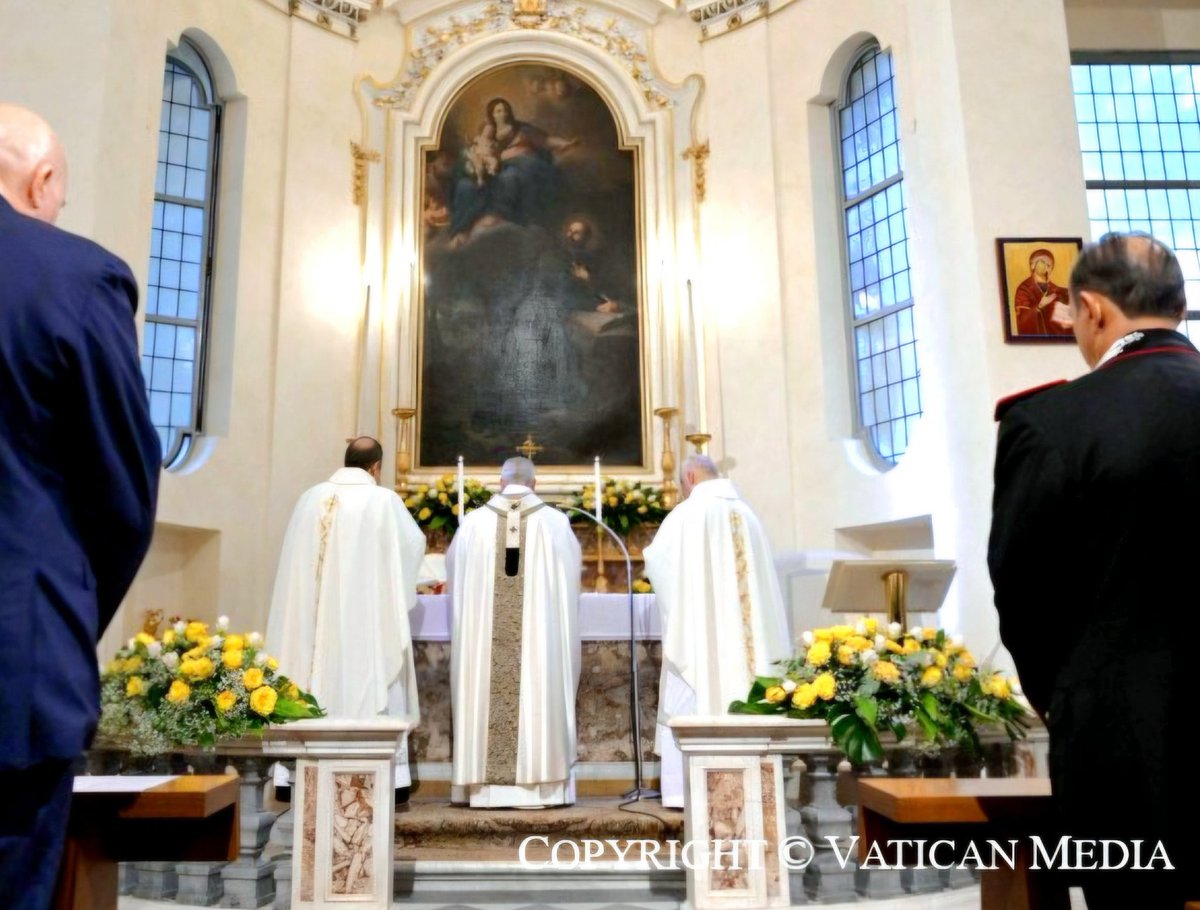Not just optional suggestions from a pastoral council…
Paul VI in 1970 calls Vatican II “Authoritative Compendium of Doctrine”
 Antipope Paul VI misled souls from 1963-1978
Antipope Paul VI misled souls from 1963-1978
(image: World History Archive / Alamy Stock Photo)
At a time when the recognize-and-resist traditionlists are running their engines at full throttle, now mainly due to the drama over “Pope” Francis’ Latin Mass suppressant Traditionis Custodes, it is important once again to draw attention to the fact that the popular resistance narratives these people have been spinning for decades simply do not jibe with reality.
Whether it be the myth that no Pope could ever abolish St. Pius V’s Tridentine Mass decree Quo Primum (FALSE), that Pope Liberius excommunicated St. Athanasius (FALSE), that the faithful’s assent is only owed to infallible Church teachings (FALSE), that one can or must refuse submission to a “bad Pope” (FALSE), that disobeying Francis today is just like St. Paul resisting St. Peter to his face in Galatians 2 (FALSE), that a Catholic is entitled to reject anything from the Pope that he judges isn’t in agreement with Tradition (FALSE), or that only those teachings are properly magisterial that have been believed “always and everywhere” (FALSE) — the list of popular pseudo-traditionlist errors is as long as it is tiresome.
The problem is that these errors have been floating around for so long and are repeated again and again that many people have come to accept them not merely as truths but as well-known truths. In the dissemination of these false ideas, the role of the late Michael Davies and the Society of St. Pius X can hardly be overestimated.
To some extent or another such errors are now being regurgitated also by the newest generation of professional recognize-and-resist traditionalists and eagerly soaked up by their hapless audiences. Among the latest generation of such pundits we may count people like Taylor Marshall, Eric Sammons, Peter Kwasniewski, Mike Church, and Kennedy Hall.
One extremely popular and persistent fable in these circles is that of the Second Vatican Council (1962-65) being merely a “pastoral” council that was not infallible, taught no doctrine, and requires no assent.
With regard to the question of infallibility, we won’t weigh the merits of that argument in this post; we will simply refer the reader to John Daly’s treatment of the issue:
In this post, instead, we will look at the broader question of the council’s authority, and in that regard we would like to present a somewhat obscure but important quote from “Pope” Paul VI (1963-1978) about Vatican II that most English-speaking traditionalists will not be familiar with, perhaps because it is published on the Vatican web site only in Italian and Portuguese.
The passage in question is taken from the beginning of an address Paul gave at a general audience on Feb. 4, 1970. An English translation of the entire discourse was published in L’Osservatore Romano, the official Vatican newspaper. It is from that translation we now quote:
We are still meditating on the Council’s teachings, for We are convinced that they constitute a Summa [summary] for our time, a very rich, authoritative compendium of doctrine and guidance for its needs. The Council marks a meaningful and decisive moment in the flow of Catholic tradition, by reason of the treasures of truth which it preserves from the past and those others which it opens up for us along the road to the future.
(Antipope Paul VI, General Audience of Feb. 4, 1970; English translation from L’Osservatore Romano, English edition, no. 7 [98], Feb. 12, 1970, p. 1.)
Who among the recognize-and-resist traditionalists agrees with that statement?
Their “Holy Father” Paul VI — remember, they insist he was a valid Pope! — describes his abominable council as a “very rich, authoritative compendium of doctrine”!
A lawyer like Christopher Ferrara would probably now rush to point out that in this quote Paul VI merely says that it is his conviction (“We are convinced”) regarding the council, and this does not imply, in and of itself, that it must be anyone else’s conviction as well. Strictly speaking, that may be true. However, when we ask ourselves from where this conviction originates, we find a very clear answer in some of Paul’s prior proclamations.
 Front page of L’Osservatore Romano, Feb. 12, 1970
Front page of L’Osservatore Romano, Feb. 12, 1970
First, it must be pointed out that each of the 16 documents the council produced, Antipope Paul VI solemnly promulgated with the following formula:
Each and every one of the things set forth in this Dogmatic Constitution [or Pastoral Constitution, or Decree, or Declaration] has won the consent of the Fathers of this most sacred Council. We, too, by the apostolic authority conferred on us by Christ, join with the Venerable Fathers in approving, decreeing, and establishing these things in the Holy Spirit, and we direct that what has thus been enacted in synod be published to God’s glory.
(Source: Walter M. Abbott, ed., The Documents of Vatican II, p. 96 and passim.)
Blasphemy!
Does anyone in the recognize-and-resist camp seriously believe that the junk published at Vatican II — think: collegiality, ecumenism, religious liberty, relations with non-Christians, etc. — has been “approved, decreed, and established in the Holy Spirit” and “published to God’s glory”? Do not words lose all their meaning if this be affirmed about the abominable Roman robber synod?
In any case, it is absolutely clear that Paul VI ratified with great solemnity and the full weight of his (supposed) authority each of the conciliar documents, thus making them, at the very least, authoritative and therefore binding on consciences.
But there is more Paul VI said about the authority of Vatican II. Note in particular the underlined portions in the following quotes:
But one thing must be noted here, namely, that the teaching authority of the Church, even though not wishing to issue extraordinary dogmatic pronouncements, has made thoroughly known its authoritative teaching on a number of questions which today weigh upon man’s conscience and activity, descending, so to speak, into a dialogue with him, but ever preserving its own authority and force; it has spoken with the accommodating friendly voice of pastoral charity; its desire has been to be heard and understood by everyone; it has not merely concentrated on intellectual understanding but has also sought to express itself in simple, up-to-date, conversational style, derived from actual experience and a cordial approach which make it more vital, attractive and persuasive; it has spoken to modern man as he is.
(Paul VI, Closing Speech for the Last General Meeting of the Second Vatican Council, Vatican.va, Dec. 7, 1965; underlining added.)
In view of the pastoral nature of the Council, it avoided any extraordinary statement of dogmas that would be endowed with the note of infallibility, but it still provided its teaching with the authority of the supreme ordinary magisterium. This ordinary magisterium, which is so obviously official, has to be accepted with docility, and sincerity by all the faithful, in accordance with the mind of the Council on the nature and aims of the individual documents.
(Antipope Paul VI, General Audience of Jan. 12, 1966; English translation from The Pope Speaks 11, n. 2 [Spring 1966], pp. 152-154; underlining added. Italian original here.)
The recognize-and-resist trads (such as Taylor Marshall) like to use only those portions of the above quotes that deny that the council issued any infallible dogmas and then, while omitting the rest, use that to tell their followers that the council need not be adhered to. But, as the full context makes clear, that is not at all what Paul VI was saying — quite the contrary!
Thus, although in his statement of Feb. 4, 1970, the false pope may have made it sound like it was merely his personal conviction that the doctrines of Vatican II “constitute a Summa for our time, a very rich, authoritative compendium of doctrine and guidance for its needs”, the fact of the matter is that this conviction must also be that of those who acknowledge him as Pope and claim to be faithful Catholics, for it originates in the solemn form of promulgation and the other authoritative pronouncements the same Paul VI made about his council.
One issue that is usually ignored regarding Vatican II is that, even if one were to grant, for the sake of argument, that the council does not require assent, does it not at least invite and certainly permit assent? Is a Catholic, then, according to these self-appointed resistance trads, at least permitted to adhere to the errors of this Modernist assembly? If not, why not?
It is one thing to say one need not submit to an ecumenical council because the Pope didn’t make it mandatory, but it’s quite another to say that that which Holy Mother Church offers to her children is toxic junk that must be rejected as a great danger to one’s soul, up to and including eternal damnation. The latter alternative is what these pseudo-trads are ultimately saying, but they don’t typically state it in such candid manner, either because they are not quite so aware of it themselves, or because such frankness would make the utter absurdity of their position obvious to all.
Therefore, people should not allow themselves to be misled. What is usually marketed as the modest non-acceptance of a few optional conciliar suggestions is in actual fact the insistence that accepting them would lead to the ruin of one’s soul and the downfall of the Catholic religion.
Now, that latter stance would be correct, of course; however, it cannot possibly be maintained under the supposition that the man who promulgated the council and solemnly ratified it was in fact the Pope of the Catholic Church — the Vicar of Christ, who possesses “the keys of the kingdom of heaven” such that “whatsoever thou shalt bind upon earth, it shall be bound also in heaven: and whatsoever thou shalt loose upon earth, it shall be loosed also in heaven” (Mt 16:19).
The conclusion, therefore, that Paul VI was not the Pope of the Catholic Church, is necessary once it is understood that what Vatican II offers to Catholics — even regardless of whether it be mandatory or optional — can under no circumstance have come from the Holy Ghost.
The Syllogism of Sedevacantism is valid.
Image sources: alamy.com (World History Archive) / Osservatore Romano (screenshot)
License: rights-managed / fair use





No Comments
Be the first to start a conversation